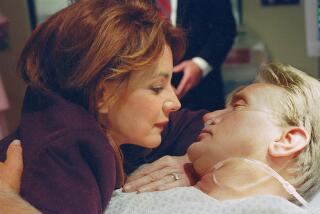‘Wilson’s War’ is more than ancient history
An 800-page draft of “Charlie Wilson’s War,” the late George Crile’s real-life tale of three unlikely heroes who helped topple the Soviet empire, languished in his desk drawer for years. Reagan-era Afghanistan is old news, publishers told the “60 Minutes” producer, who spent more than a decade on the manuscript.
“There were stretches of time when George believed all this work would never be seen,” said Susan Lyne, chief executive of Martha Stewart Living Omnimedia and former ABC Entertainment chief, who was married to Crile. “Then 9/11 put Afghanistan back on the front pages. There are ironies here.”
Published in 2003, Crile’s bestseller drew comparisons with Tom Clancy and Ian Fleming.
“The story was fairy tale, spy novel, history lesson, rolled into one,” said Crile’s sister-in-law Barbara Lyne, who edited his copy and to whom the book is dedicated. “As George was writing, we’d chuckle and howl about how we’d do it if we were making a movie.”
That vision finally became a reality last week when Universal Pictures released Mike Nichols’ $76-million film version which stars Tom Hanks, Julia Roberts and Philip Seymour Hoffman (it has garnered mixed reviews and so-so box office). It has been nominated for a Golden Globe in the musical/comedy best picture category; Hanks, Roberts and Hoffman received nods for their work along with screenwriter Aaron Sorkin.
Hanks plays Charlie, a scandal-plagued, womanizing Texas congressman goaded into action by Joanne (Roberts), a right-wing socialite who uses her feminine wiles to advance the anti-Communist cause. They join forces with Gust (Hoffman), a foul-mouthed, rogue CIA agent, providing Afghan rebels with state-of-the-art weapons with which they ousted their occupiers.
The covert operation was considered the agency’s most successful ever -- an assessment revised over time. In an epilogue eventually cut from the film, Crile describes how Islamic extremists filled the vacuum, becoming the archenemy of the U.S.
Succumbing to pancreatic cancer in 2006, Crile never saw the film. Still, he delivered specific marching orders through e-mails and conversations. My heroes may be flawed, he told Gary Goetzman and his producing partner Hanks, whose Playtone Productions optioned the book. But they’re heroes, nonetheless.
“It would have been easy to make caricatures of such colorful people,” said Goetzman. “George didn’t want them portrayed as buffoons.”
Sorkin, creator of NBC’s “West Wing” and writer of such films as “A Few Good Men,” and “The American President” seemed tailor-made for the job. A master of “crackling dialogue,” as Goetzman puts it, he has a hotline to backroom Washington.
Confident in his choice, the producer got out of the way. His sole instruction to the writer: “Hit it out of the park.” Sorkin was just afraid he’d strike out.
After all, this was his first attempt at adapting someone else’s material and his first nonfiction outing. His MFA in theater didn’t teach him much about the mujahedin (Islamic holy warriors), he says. And he’s far more comfortable with “people in a room talking” than with action and decadence.
“Things blow up, Charlie soaks in a hot tub with strippers -- I was afraid this had to be ‘MASH’,” Sorkin said. “[Former Universal chairman] Stacey Snider shamed me into it. ‘I’ll never consider you a real man unless you write this movie,’ she said -- the same approach Joanne used to recruit Charlie.”
Sorkin called up Oscar-winner Akiva Goldsman (“A Beautiful Mind”) who gave him some advice. “Fall out of love with the book,” his friend told him. “Your job is not to write a faithful adaptation but to write a good movie.” A nervous Sorkin sat down with Crile, informing him of that tack. Be more scared of Mike and the audience than me and the book, the author said.
Mike Nichols’ challenge
“Mike,” of course, was veteran director Nichols. He signed on after reading Sorkin’s 145-page draft, written over the course of eight months. The screenwriter tackled the project after turning out the pilot for “Studio 60 on the Sunset Strip,” which ended up having an unsuccessful one-season run (a fact that increased the pressure he felt in writing “Charlie,” Sorkin concedes).
Just shaping the book’s complicated reality into an audience-friendly movie was difficult enough, according to Nichols.
“It’s murder nudging reality into a metaphor that works,” Nichols said. “And real life stories are hard because you can’t make anything up. ‘Character’ was essential. The overriding thread: How does someone dedicated to the pleasures of the flesh transform himself in order to make a difference?”
Though humor is a strong suit of Nichols, he let Sorkin take the lead. The writer provided some snappy one-liners. “You ain’t James Bond,” Wilson says to Gust, the gum-chewing son of an immigrant soda pop maker, when the two of them first meet. “You ain’t no Thomas Jefferson,” Gust retorts, “so let’s call it even.”
It was Nichols, however, who contributed the vignette that provides a kind of coda to the film -- a fable of unintended consequences, recounted by Gust to Charlie. A horse is given to a boy and the villagers rejoice. “We’ll see,” the Zen master says. The child falls off and breaks his leg, an unfortunate turn of events. War breaks out and the injury keeps the boy at home, a blessing, it seems. Good and bad intertwine, Nichols maintains -- in politics and life.
Several scenes foreshadow the gathering terrorist clouds that would soon take over Afghanistan and other parts of the Muslim world. Gust talks of the “crazies” invading Kandahar. Charlie warns the defense appropriations subcommittee, on which he sits, that the victory might be credited to Allah. Some critics, looking for a “political” movie that would tie in to later developments on 9/11 and the Iraq War, wanted those points harder hit.
He wasn’t making a documentary, Nichols explains -- merely telling Crile’s story. And with only 97 minutes of screen time (Playtone likes short films), tough choices had to be made. Though a spate of anti-Iraq movies had tanked, he says, it was the creative, not the commercial, that led him down this path.
“You can’t make a movie about everything -- then, now, before, later, this war and Iraq,” he said. “I knew this would happen. When I traveled to colleges with ‘The Graduate,’ people wanted to know why it wasn’t it about Vietnam.”
The 45-second epilogue was a hot-button topic during the postproduction process. Though Sorkin was vocal in opposing the cut, he has since had second thoughts. People at the research screening were glad not to be hit over the head, he says. And it’s too simplistic to suggest that Charlie’s campaign set 9/11 in motion.
Goetzman agrees. “No Afghans, as far as we know, have been involved in terrorist acts against our country,” he said. “We shouldn’t’ be swatting at hornets nests we know nothing about.”
Crile, too, was accused of ambiguity. Without nuance, he feared, his over-the-top tale could become propaganda, appropriated by the right or the left.
Still, he continued to pursue the story. At the time of his death, he was working on “The Second Act,” delineating American mistakes in Afghanistan and examining what came next.
“Had George lived, he’d have been a nightmare for much of the [filmmaking] process, fighting for this and that,” said Lyne, who was kept in the loop throughout. “But at the end of the day, he’d be happy. The film moves along like a freight train, the characters are compelling, and letting people connect the dots allows them to feel smart.”
More to Read
Sign up for our Book Club newsletter
Get the latest news, events and more from the Los Angeles Times Book Club, and help us get L.A. reading and talking.
You may occasionally receive promotional content from the Los Angeles Times.






